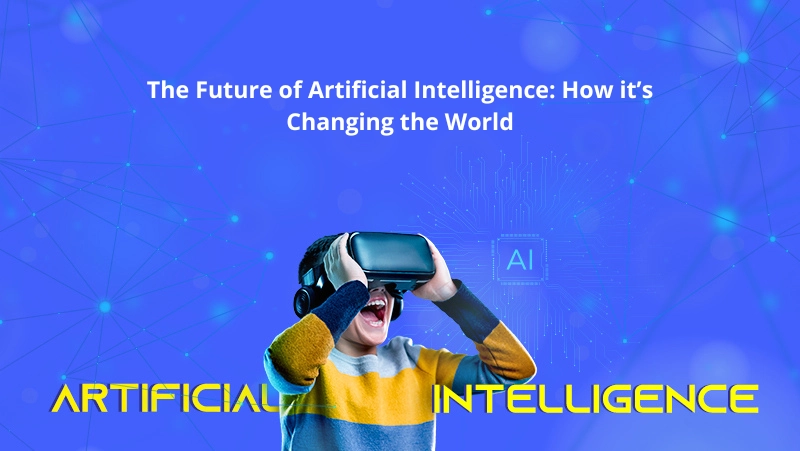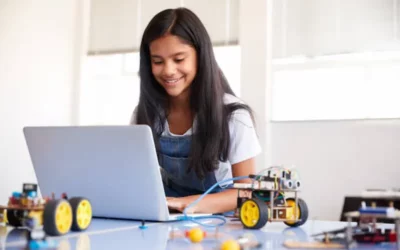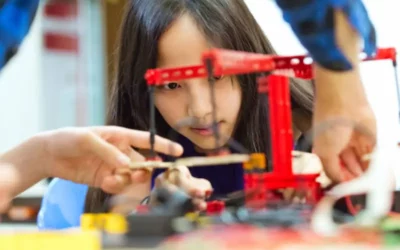Artificial Intelligence (AI) has emerged as a game-changing technology that is now at the forefront of innovation, transforming every sector in ways that were once thought impossible. With its incredible potential to improve efficiency, accuracy, and productivity, AI is rapidly becoming a go-to word for businesses and organizations worldwide and is driving a new era of technological advancement that promises to reshape the future of our world.

Undoubtedly AI is reshaping the entire system, but how exactly?
In this blog, we will explore some of the greatest advancements in Artificial Intelligence that have taken place in recent times. We will take a look at how AI is changing the way we live and work, and discuss the potential of this transformative technology to shape the future of our world.
Additionally, we will introduce some exciting AI tools towards the end of this blog that can simplify tasks and make your life easier.
Table of contents
What is Artificial Intelligence?

Artificial Intelligence in a simpler context can be explained as a way of giving a human-like brain to the computer. This is essential to make the computer self-capable to recognize patterns, make decisions, organize information, and solve problems.
For accomplishing these human-like tasks, it uses a range of algorithms and techniques that include machine learning, deep learning, computer vision, Natural Language Processing (NLP), and many more.
Artificial Intelligence has become ubiquitous in our daily lives, with most of us unknowingly utilizing its tools and applications. Voice assistants like Alexa from Amazon and Siri from Apple are common examples of conversational AI systems that are now a part of our daily routine. Furthermore, the facial recognition feature on our smartphones uses AI-based facial detection technology to unlock our devices. These are just a few examples of how AI has become an integral part of our lives.
As we dive into the world of Artificial Intelligence, it becomes increasingly apparent how it will transform and reshape different industries across a diverse range of sectors. The potential of AI to revolutionize and enhance various domains is immense, and it’s fascinating to examine how it will impact and improve our lives in the near future.
Artificial Intelligence in HealthCare

AI-based tools and devices have already taken a major toll on improving the healthcare sector. They are helping in –
- Mining clinical data
- Forecasting early detection of life-threatening conditions
- Prompt and accurate health screening results
- Cancer testing and assessment
- Advanced prediction of maternal and neonatal health outcomes, using cutting-edge techniques
These are only a handful of examples, from the use of Artificial Intelligence (AI) tools to strengthen disease diagnosis and prediction to the execution of innovative healthcare delivery models, the healthcare industry is undergoing significant evolution.
Artificial Intelligence in Business

Artificial Intelligence is rapidly shaping businesses across various industries, providing new opportunities for innovation, growth, and efficiency. Here are some of the ways –
- AI-powered predictive analytics can forecast demand, optimize inventory and supply, and identify new business opportunities.
- AI-powered customer service chatbots such as virtual assistants are revolutionizing the client experience. These are helping businesses offer 24/7 support, analyze customer requests and responses, broadcast targeted advertisements, and personalized suggestions and recommendations.
- AI-powered payment systems and Fraud detection systems are extensively trained over a vast volume of digital transactions to identify and protect users from fraudulent transactions.
Artificial Intelligence in Education

It is now becoming common to deploy and use AI-powered tools in all schools, colleges, and universities across the world. The use of Artificial Intelligence is helping in improving the learning experience of students and is also offering new solutions and better formats of teaching.
- AI-powered tutors are now being used by universities and colleges, where they provide additional support as assistants for students in solving doubts, learning basic math and grammar, improving writing skills, and many others.
- AI-powered Grading Systems are helping teachers in saving time and effort in evaluating students’ tests and homework. Automating the grading system is helping teachers to invest more time with students rather than getting immersed in the manual task of correction.
- AI-powered Individual Development Programs (IDPs) are revolutionizing the way students learn by offering personalized learning and growth plans based on their unique pace of learning and understanding of concepts. With the help of these programs, students can move at their own speed to complete the course, resulting in better learning outcomes and increased engagement.
Will Artificial Intelligence Replace Employment?
The emergence of generative AI tools like ChatGPT, Microsoft Bing, Google’s Bard, and others has brought significant changes to many sectors, from automated email drafting and customer service responses to artistic creations and design. While these tools offer increased efficiency and convenience, there is also skepticism about the potential job losses that may result.
However, it’s important to note that AI tools are not a complete replacement for human creativity and innovation. Despite their advanced capabilities, AI tools cannot replicate the unique, imaginative, and often unpredictable nature of human creativity. As such, while AI may be able to handle routine or mundane tasks, the creative instinct of a human is still essential for developing novel solutions and pushing the boundaries of what is possible.
The Jobs which AI cannot replace –
- Mentors, Teachers, and Professors
- Lawyers
- Medical Practitioners and Doctors
- Therapists of all kinds
- Strategic planners
- Corporate leaders
- Human Leaders such as governors and ministries in any administration.
Drawbacks of Artificial Intelligence
As AI continues to evolve and improve, it presents both great opportunities and significant risks, making it a double-edged sword in the world of technology.
- AI tools can never go beyond Human Creativity and Imagination. Relying too heavily on AI for creativity and imagination may have unintended consequences, such as stifling human thought and limiting our ability to think outside the box. Therefore, it’s crucial to strike a balance between using AI as a tool to support human creativity and maintaining the freedom and flexibility to explore new ideas beyond the boundaries of what AI can currently achieve.
- While AI tools have revolutionized the way we generate content and analyze data, they are not infallible. They require human oversight and review of AI-generated content and data to catch errors, inconsistencies, and potential biases that may not be apparent to a machine.
- AI tools undoubtedly lack the human ability to empathize and show emotional intelligence, which is critical for making sound decisions in life. Machines cannot always be relied on to make the right decisions, as they lack the contextual understanding and nuanced decision-making abilities of human beings.
3 Smart Free AI tools
Profile Picture Creator – Looking for an effortless and fun way to customize your social media profile picture? Look no further than Profilepicture.AI! This easy-to-use tool allows you to quickly edit your picture with a wide variety of customization options, giving you the ability to create a unique and eye-catching profile picture that truly represents you.
AI Joke Creator – Looking for a good laugh? Look no further than this simple AI tool Aiisajoke! With just a topic, you can get an instant joke that’s sure to make you chuckle.
Lumen5 Video Creator – Lumen5 uses AI & ML to help you turn blog posts, whitepapers, and other written content into videos with the click of a button. Lumen5 can quickly summarize your blog post and utilize AI to pair each section with appropriate stock footage. By leveraging algorithms based on average reading speed, Lumen5 algorithmically determines the timing of each scene. Additionally, it calculates the optimal text positioning and scene composition to generate a visually engaging output.
Conclusion
In conclusion, while AI offers significant benefits in many areas, it should be seen as a complementary tool rather than a replacement for human creativity and imagination. By leveraging the strengths of both AI and human intelligence, we can achieve better outcomes and advance our understanding of the world around us. Ultimately, a combination of human intuition and AI capabilities can lead to more effective and well-informed decisions.
Know more about learning programs for kids for better future.
Visit the most recent entertaining blogs on the BrightCHAMPS blog page like advantages of machine learning for kids to find out more about several tools that can aid in your kid’s growth and development! Learn about coding for kids also.
Frequently Asked Questions (FAQs)
Artificial Intelligence in a simpler context can be explained as a way of giving a human-like brain to the computer. This is essential to make the computer self-capable to recognize patterns, make decisions, organize information, and solve problems.
Natural language processing (NLP) and chatbots for customer service, Image recognition and computer vision for autonomous vehicles, security systems, and medical imaging, Robotics for manufacturing, agriculture, and healthcare, and Speech recognition for virtual assistants and voice-controlled devices are a few best examples of the usage of AI.
AI learns through a process called machine learning, which involves training algorithms on large datasets to identify patterns and make predictions.


 ⭐⭐⭐⭐⭐
As a full-stack developer with expertise in both frontend and backend technologies, I have honed my skills through years of experience. Over the last 2 years, I have been working as a mentor and successfully imparted tech skills to more than 500+ students. My journey of empowering the youth has been made possible by the invaluable support and opportunities provided by Brightchamps.
⭐⭐⭐⭐⭐
As a full-stack developer with expertise in both frontend and backend technologies, I have honed my skills through years of experience. Over the last 2 years, I have been working as a mentor and successfully imparted tech skills to more than 500+ students. My journey of empowering the youth has been made possible by the invaluable support and opportunities provided by Brightchamps.
























